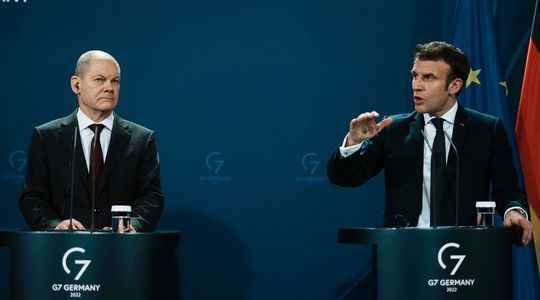It is a beautiful rabbit that Emmanuel Macron pulled out of his hat, Thursday, October 20, to put an end to the energy imbroglio which has poisoned relations between Madrid and Paris for months. Just before the start of the European Council in Brussels, the French president made an appointment with the Prime Ministers of the Iberian Peninsula, the Spaniard Pedro Sánchez and the Portuguese António Costa. Agenda: propose an alternative project to the MidCat, this famous gas pipeline imagined in the 2000s to supply Europe with gas from Spain.
Reluctant to this project, because of its cost (3 billion euros), its implementation time, its environmental impact and its very relative interest for France, Emmanuel Macron had declared in September that Europe’s gas supply problem was not going to be solved “by jumping on this gas pipeline like goats from the Pyrenees”. He proposes to build, instead, an underwater pipe between Barcelona and Marseille, hence its name, BarMar.
Initially, it will transport gas, but will aim to transport hydrogen produced in Spain with green electricity (wind or solar). “The goats of the Pyrenees turn into dolphins”, ironically the Spanish geographer Josep Vicent Boira. “We are changing the name and the route, but it remains a pipe used to send fossil gas between Spain and France. This will generate major works in an area extremely rich in biodiversity”, deplores Anna-Lena Rebaud, door- word of the association Friends of the Earth.
Win-win agreement
In doing so, the three countries would win on all counts. Spain and Portugal would get a new fixed link with northern Europe, which they have been crying out for since the outbreak of war in Ukraine. France would become a stakeholder in an investment intended to eventually transport energy judged “for the future” by the International Energy Agency.
In the shorter term, this ‘pipe’ would make it possible to alleviate the crisis caused by the disruptions in the supply of Russian gas. Because Spain buys a lot of gas in liquid form (LNG), mainly in the United States, since it got angry with Algeria, so far its main supplier. Between them, Spain and Portugal have 45% of European liquefied natural gas storage capacity and more than 30% of regasification capacity, while Germany, which is extremely dependent on Russian gas, is desperate and trying to get some from Madrid and Lisbon.
A step towards Berlin
And there are other advantages. On the Spanish side, the gas interconnection is a unifying subject with the Catalans. Barcelona sees it as a way to revitalize a local economy damaged by the independence fever of 2017 which scared away a very large number of companies. In Madrid, the Sánchez government also has every interest in caressing the Catalans in the direction of the hair. Without the support of the deputies of Esquerra Republicana de Catalunya, the party in power in Barcelona, he would indeed lose the majority in the national Parliament, while general elections are scheduled in a year.
As for Emmanuel Macron, he offers himself with BarMar the means of easing energy tensions and attenuating criticism, in Brussels and, above all, in Berlin, on his opposition to the initial project, the Midcat gas pipeline. The subject will most certainly be on the agenda, this Wednesday, October 26, during the lunch between Emmanuel Macron and Chancellor Olaf Scholz, in Paris. In the meantime, the horizon is clearing up between France and Spain. The two countries must sign a “friendship treaty” at the end of January 2023, on the model of that signed in 2021 with Italy. And in 1963 with Germany.
